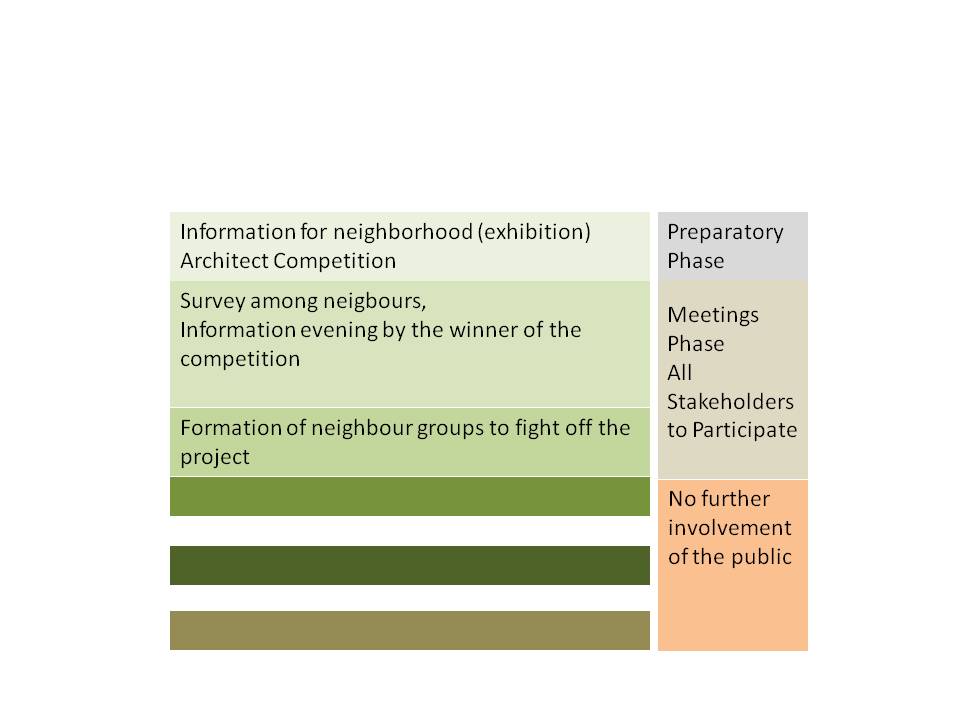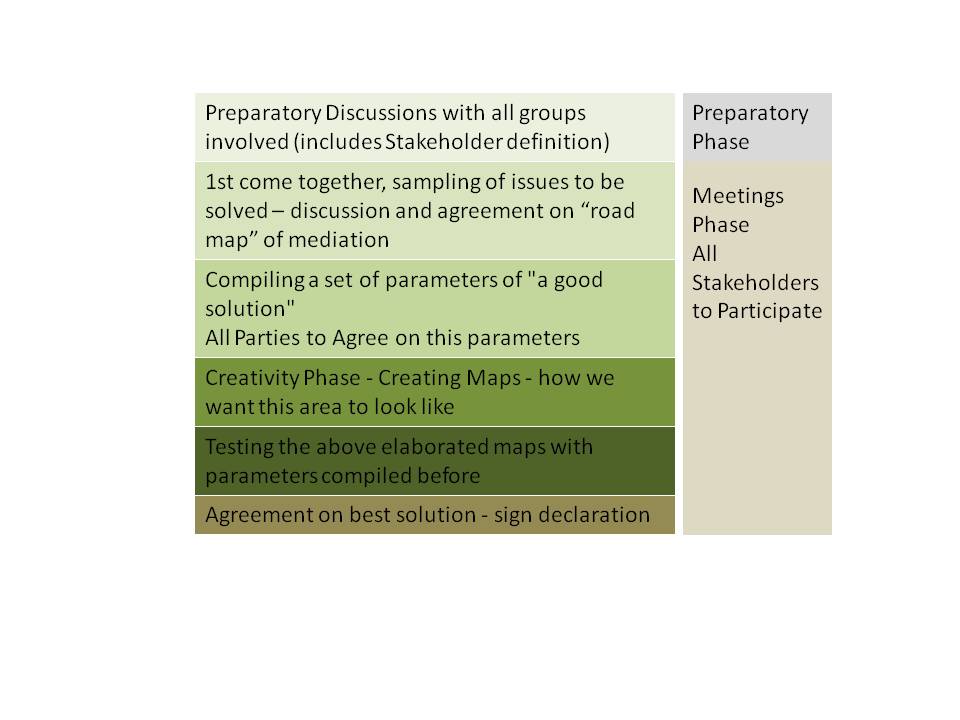Urban Redevelopment Eisring Süd in Vienna, Austria: Difference between revisions
| (15 intermediate revisions by one other user not shown) | |||
| Line 13: | Line 13: | ||
| '''Completion''' || style="background:Lavender"|''currently under construction, planned to be finished 2012'' | | '''Completion''' || style="background:Lavender"|''currently under construction, planned to be finished 2012'' | ||
|- | |- | ||
| '''Client''' || style="background:Lavender"|'' | | '''Client''' || style="background:Lavender"|''City of Vienna'' | ||
|- | |- | ||
| '''Project costs''' || style="background:Lavender"|''Please enter the costs (if known)'' | | '''Project costs''' || style="background:Lavender"|''Please enter the costs (if known)'' | ||
| Line 37: | Line 37: | ||
[[Image:eisring_sued_scheme1.jpg]] | [[Image:eisring_sued_scheme1.jpg]] | ||
While this image showes what actually had been done | |||
[[Image:Public_Participation_-_Scheme2.jpg]] | |||
=== Who initiated the project and why? === | === Who initiated the project and why? === | ||
| Line 44: | Line 47: | ||
The competition was won by Hermann & Valentiny und Partner with Architekt Podsedensek ZT GmbH and landscape architect Jakob Fina. | The competition was won by Hermann & Valentiny und Partner with Architekt Podsedensek ZT GmbH and landscape architect Jakob Fina. | ||
=== When was public participation most intensive? === | |||
Public aparticipation took place in the form of a survey among citizens living nearby. An information evening was held and an exhibition of the winner project was organised to inform the public | Public aparticipation took place in the form of a survey among citizens living nearby. An information evening was held and an exhibition of the winner project was organised to inform the public | ||
=== Which participation tools have been applied? === | === Which participation tools have been applied? === | ||
Survey | |||
Exhibition | |||
Information Evening with Politicians | |||
==== On which level of participation? ==== | ==== On which level of participation? ==== | ||
The level of participation was Information and Consultation, but unfortunately not more, It would have been ideal to reach Acting/Planning together | |||
=== Which stakeholders have been involved? === | === Which stakeholders have been involved? === | ||
Citizens living nearby | |||
=== Have there been any festivities in order to involve the public? === | === Have there been any festivities in order to involve the public? === | ||
No real festivities, the exhibition was opened to the public with a small event | |||
=== Who made the major decisions and when? === | === Who made the major decisions and when? === | ||
The major decisions were all done b< the city of Vienna employes, first by an invited competition, then by only formal but no real public participation. Then the winner project was chnged and the sports sites were reduced compared to enlarge the housing area and shopping mall. | |||
This finally lead to protests among citizens and the formation of a neighbourhood initiative against the project | |||
< | |||
[[#toc|'''Back to top''']] | [[#toc|'''Back to top''']] | ||
Latest revision as of 08:30, 14 March 2019
back to Project Biography List
Rationale: Why is this case interesting?
This case is an example for a project that should have had better public participation. Although cititzens were involved in the project and formed interest groups no public particiation took place in the actual planning phase, which kept the actual participation level to a minimum. So although one may say that the public was formally involved the actual input was kept low.
The project is about to be built - neighbours have formed groups to fight against the project, it is about to come into a hot phase...
Author's personal background
I am an educated landscape architect and mediator for civil rights in Austria, with a special education for mediation in planning (mediation for groups of more than 2 persons) Currently I work at Vienna University of Technology and for ECLAS
Process Biography Scheme
This scheme showes how ideal public participation might have looked like
While this image showes what actually had been done

Who initiated the project and why?
In 2008 the City of Vienna launched an (invited) competition for the redevelopment of the former Eisingr Süd Area. the area used to be a sports area in a densly built environment in Viennas 10 district. The sports consisted of a skating area and tennis and sports sites. Most parts were already close, only the skating part was still open and in function. the aim of the redevopment was to keep a (smaller) sports area and to add a housing area and a small shopping mall. The competition was won by Hermann & Valentiny und Partner with Architekt Podsedensek ZT GmbH and landscape architect Jakob Fina.
When was public participation most intensive?
Public aparticipation took place in the form of a survey among citizens living nearby. An information evening was held and an exhibition of the winner project was organised to inform the public
Which participation tools have been applied?
Survey Exhibition Information Evening with Politicians
On which level of participation?
The level of participation was Information and Consultation, but unfortunately not more, It would have been ideal to reach Acting/Planning together
Which stakeholders have been involved?
Citizens living nearby
Have there been any festivities in order to involve the public?
No real festivities, the exhibition was opened to the public with a small event
Who made the major decisions and when?
The major decisions were all done b< the city of Vienna employes, first by an invited competition, then by only formal but no real public participation. Then the winner project was chnged and the sports sites were reduced compared to enlarge the housing area and shopping mall. This finally lead to protests among citizens and the formation of a neighbourhood initiative against the project
References
back to Project Biography List

